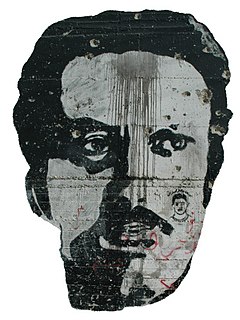A Quote by Ronald Reagan
We know that this mad dog of the Middle East has a goal of a world revolution. (On Muammar Qaddafi of Libya)
Quote Topics
Related Quotes
I'm going to be specific so you can render your verdict. Let's go to North Africa, she was the chief engineer of the disastrous overthrow of [Muamar] Qaddafi in Libya. Libya today after Hillary Clinton's grand strategy? Their economy's in ruins. There's death and violence on the streets, and ISIS is now dominating that country.
There's more than 1700 emails out of the thirty three thousand Hillary Clinton emails that we've published, just about Libya. It's not that Libya has cheap oil. She perceived the removal of [Muammar] Gaddafi and the overthrow of the Libyan state - something that she would use in her run-up to the general election for President.
Peace in Syria is not only our priority; it's a Middle Eastern priority, and when the Middle East is stable, the rest of the world is stable, because the Middle East is the heart of the world geographically and geopolitically, and Syria is the heart of the Middle East geographically and geopolitically.
I visited Libya in September 1996 for the 27th anniversary of the 'revolution' - a military coup that a 27-year-old Gadhafi led to topple the monarchy and since which he has ruled. Some were optimistic that Gadhafi's 'revolution' could herald a new Libya, but it didn't take long for his brutality to stamp out any such hopes.
Israel's democracy is the bedrock on which our relationship stands. It's a shining example for people around the world who are on the frontline of the struggle for democracy in their own lands. Our relationship is also based on our common interest in a more stable and peaceful Middle East, a Middle East that will finally accord Israel the recognition and acceptance that its people have yearned for so long and have been too long denied, a Middle East that will know greater democracy for all its peoples.
































